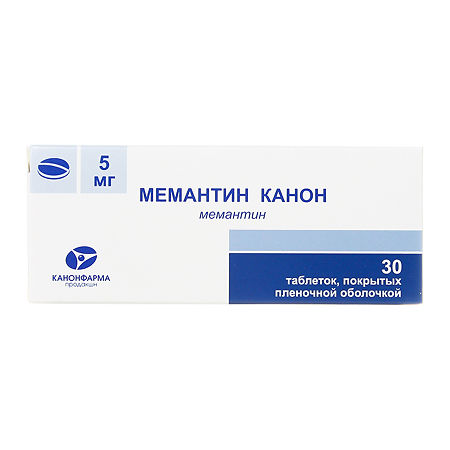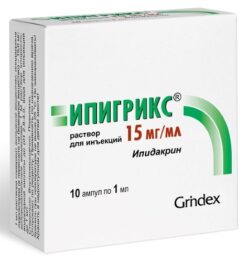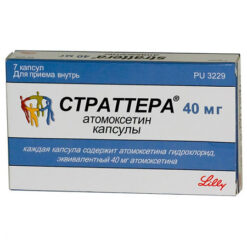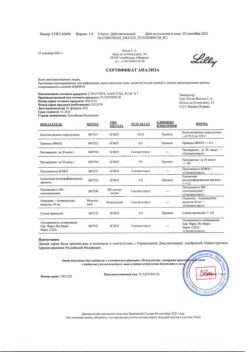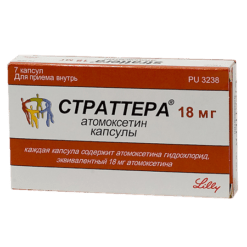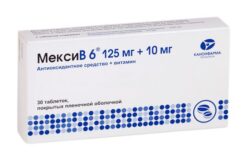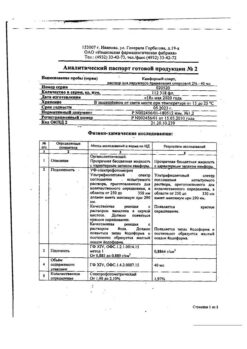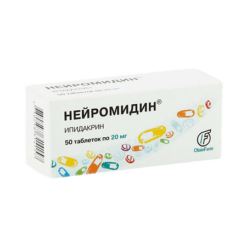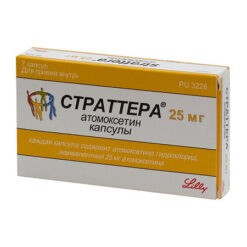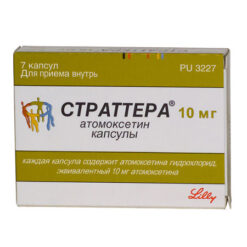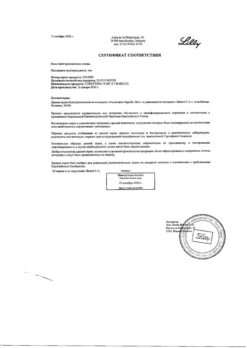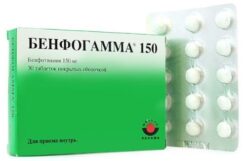No products in the cart.
Memantine Canon, tablets 5 mg 30 pcs
€1.00
Out of stock
(E-mail when Stock is available)
Description
A derivative of adamantane, similar in chemical structure and pharmacological properties to amantadine.
Memantine blocks glutamate NMDA receptors (including in the substantia nigra), thus reducing the overstimulating effect of cortical glutamate neurons on the neostratum, which develops against the background of insufficient dopamine release.
There is currently no evidence base reliably demonstrating the drug’s ability to slow or prevent the progressive course of Alzheimer’s disease.
Indications
Indications
Dementia (Alzheimer’s type, vascular, mixed dementia of all degrees of severity); dysfunction of the central nervous system of mild to moderate severity (weakened memory and ability to concentrate, loss of interest in activities, fatigue, limited ability to care for oneself); cerebral and spinal spastic syndrome (due to traumatic brain injury, multiple sclerosis, stroke), Parkinson’s disease, parkinsonism.
Pharmacological effect
Pharmacological effect
A derivative of adamantane, its chemical structure and pharmacological properties are close to amantadine.
Memantine blocks glutamate NMDA receptors (including in the substantia nigra), thereby reducing the excessive stimulatory effect of cortical glutamate neurons on the neostratum, which develops against the background of insufficient dopamine release.
At the moment, there is no evidence base reliably demonstrating the ability of the drug to slow down or prevent the progressive course of Alzheimer’s disease.
Active ingredient
Active ingredient
Memantine
Composition
Composition
1 film-coated tablet, 5 mg contains:
active substance:
memantine hydrochloride 5 mg;
excipients:
calcium hydrogen phosphate dihydrate 24.3 mg,
colloidal silicon dioxide 2 mg,
croscarmellose sodium 2.8 mg,
lactose monohydrate 61.6 mg,
magnesium stearate 0.7 mg,
povidone K-30 3.6 mg;
film shell:
Opadry white 3 mg, including: hypromellose
(hydroxypropyl methylcellulose) 1.0125 mg, hyprolose (hydroxypropylcellulose) 1.0125 mg, talc 0.6 mg, titanium dioxide 0.375 mg.
Contraindications
Contraindications
Severe renal failure; severe liver failure; congenital galactose intolerance; lactase deficiency or glucose/galactose malabsorption syndrome; pregnancy, lactation period; children under 18 years of age (efficacy and safety have not been established); hypersensitivity.
Use with caution in patients with thyrotoxicosis, epilepsy, myocardial infarction (including a history), heart failure of the NYHA functional class III-IV, a history of convulsive syndrome, with simultaneous use of NMDA receptor antagonists (amantadine, ketamine, dextromethorphan), in the presence of factors that increase urine pH (sudden change of diet, heavy intake of gastric buffers), for severe urinary tract infections, uncontrolled arterial hypertension, renal failure, liver failure.
Side Effects
Side Effects
Dizziness, internal or motor restlessness, increased excitability, fatigue, increased intracranial pressure, nausea.
Interaction
Interaction
When used simultaneously with levodopa, dopamine receptor agonists, and m-anticholinergic drugs, the effect of the latter may be enhanced.
When used simultaneously with barbiturates and neuroleptics, the effect of the latter may decrease.
When used together, it may change (increase or decrease) the effect of dantrolene or baclofen, so the doses of the drugs should be selected individually.
Concomitant use with phenytoin, amantadine, ketamine and dextramethorphan should be avoided.
It is possible to increase the plasma concentrations of cimetidine, procainamide, quinidine, kinine and nicotine when taken simultaneously with memantine.
A decrease in the concentration of hydrochlorothiazide is possible when taken simultaneously with memantine.
Based on the experience of post-marketing use of the drug, isolated cases of decreased MHO in patients simultaneously taking warfarin have been reported.
In pharmacokinetic studies in healthy young volunteers, no interaction effects were observed with a single dose of memantine with metformin or donepezil.
Also, in similar studies, no interaction with galantamine was found.
Overdose
Overdose
During ongoing clinical trials and post-marketing studies of the drug, a limited amount of information about overdoses was obtained.
Symptoms: With sufficiently large overdoses (200 mg once or more than 100 mg per day for 3 days), the following symptoms were identified: weakness, fatigue, diarrhea or absence of symptoms. With an overdose of less than 140 mg or with an unknown overdose, the following adverse events were identified from the nervous system (confusion, drowsiness, dizziness, agitation, aggression, hallucinations and gait disturbance) and from the gastrointestinal tract (vomiting and diarrhea).
In the most serious cases of overdose, the patient survived after taking more than 2000 mg of memantine with adverse effects on the nervous system (coma for 10 days, diplopia, agitation). The patient received symptomatic therapy and plasmapheresis and recovered without any consequences.
Another reported case of serious overdose is 400 mg once. The patient recovered without consequences. Reactions from the nervous system were noted: anxiety, psychosis, visual hallucinations, stupor, drowsiness, unconsciousness.
Treatment: in case of overdose, symptomatic treatment is necessary. There is no specific antidote for memantine intoxication. Carry out standard procedures for evacuating the drug by washing, using activated carbon, forced diuresis, and urine alkalizing agents. If symptoms of over-irritation of the central nervous system appear, symptomatic therapy should be selected extremely carefully.
Manufacturer
Manufacturer
Kanonpharma production CJSC, Russia
Additional information
| Manufacturer | Kanonfarma Production ZAO, Russia |
|---|---|
| Medication form | pills |
| Brand | Kanonfarma Production ZAO |
Related products
Buy Memantine Canon, tablets 5 mg 30 pcs with delivery to USA, UK, Europe and over 120 other countries.

